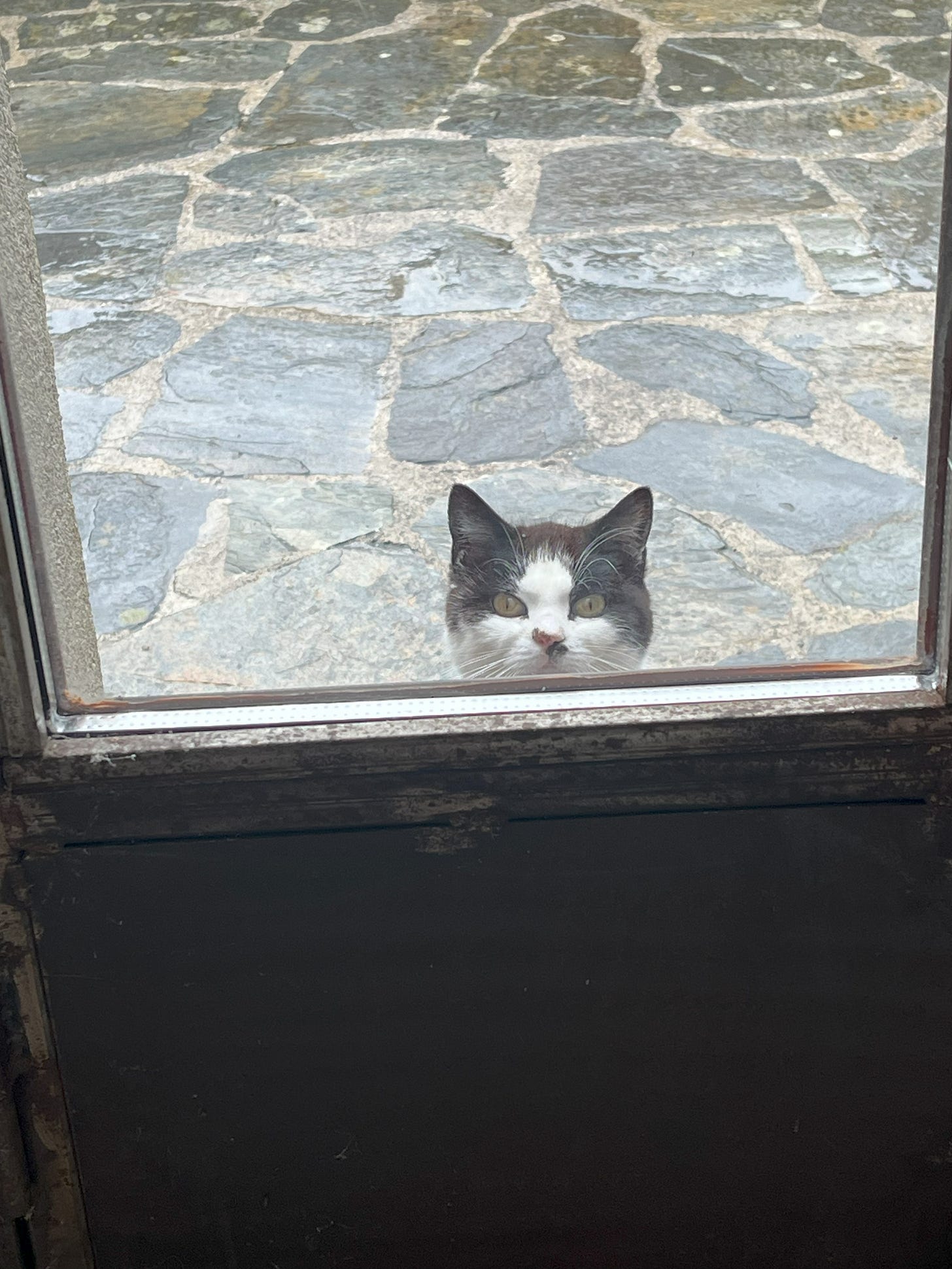Don’t know about you, but I approach writing like a cat trying to find the best way to fit inside a cardboard box. Here is the cat Oreo (not her real name), missing her cardboard box:
Oreo is like me. She must first examine scraps of paper stacked in piles or clipped into notebooks. She must then make sure the right pieces of paper cover her desk in the right order. After several 360-degree turns, she squeezes into her box.
She does not have a laptop. I do. My final step is to see if my laptop is propped at precisely the right angle to avoid that same pain in the neck that almost killed me last year (see my October 1 newsletter “Of Guillotines and Pinkie Fingers” if you’re wondering).
The rest is silence. Unlike Oreo, I need silence. Or something close to it.
What if that cardboard box is missing? It is safe to say, none of the above is consistently possible when you write on the road. Miracle of miracles, I learned to cope during the past last three months of traveling.
My trip featured a five-day workshop in Catalonia for screenwriters (the Rocaberti Writers Retreat) and a seven-day stay at La Muse Artists and Writers Retreat, which takes place in a farmhouse in the Montagne Noire, a mountain range tucked inside the hem of the skirt of the Massif Central in Southwest France.
Here’s my list of five considerations based on this experience for writing while traveling:
1) Silence be damned. Don’t stop the music. Don’t lose your momentum. That might just mean finding a way to keep stuff in mind.
During the Rocaberti Writers Retreat, I did not find a nook, either in time or space, for making revisions to my lengthy work-in-progress, “This Riveting Screenplay.”
But I did find it fruitful to take a break from the writing, unplug my ears, and glue my eyes to the presenters at each session. Also, opportunities to get to know my fellow workshop participants and mentors lasted only that week, so I sought as much time with them as possible. Then came the pitch session, which went better than I thought.
In the process, momentum on ideas continued. I surfaced from the retreat with pages of notes and scribbles.
2) Pick the project that goes with the flow of where you are at the moment, with a precise goal in a reasonable time frame.
After I left Spain, I spent a week in the home of a friend’s lovely French parents on the way to the second retreat. We stuck to a strict culinary schedule here, folks. No skipping meals. Quelle idée! When it was time for “La Soupe!” it really was time for la soupe.
The project that best suited soup precisely at 7:00 p.m. every evening, as well as dazzling day-time conversations between scheduled meals, was translation to Spanish of my blog Third Place Cafe Stories. Translating involves spoon-size tasks, and scheduled meals helped. Sincere thanks to Mme. Montagnon and her delicious soups.
3) Silence be sought. How about lengthy quiet time with a dash of low-key company?
The next stage of my trip was La Muse Artists and Writers Retreat. I kept up the translation, to which I’d allocated another month to finish, and dusted off two personal essays.
This choice was helped by long periods of quiet time, as well as colleagues working on similar projects. We met up in the library or kitchen to compare notes. We also read selections of our work on the last night.
If you haven’t guessed whether or not I recommend La Muse, the answer is Yes! Yes! Yes! For even more inspiration than the name implies, you can look to the free-spirited cats on the terrace, who do not seem to need cardboard boxes. Imagine that.
This cat, no relation to Oreo, was asking for cheese:
4) There is a reason writing is often a lonely endeavor. Isolation is sometimes needed to finish things.
I next rented a studio apartment on the southern-most Mediterranean coast of France, in Collioure, compliments of a friend of the same friend whose mother made me soup. Taking advantage of the quiet, I finished the drafts of the essays, as well as the translation.
If the silence was too much, I escaped to the cafe across the street, where I met Oreo. Here she is again, refusing to be coaxed into anything other than a smirk. Maybe she still missed her cardboard box.
5) At some point, if you have a longer project, stop moving. Two weeks in one place seemed about right for most of my writing projects. But I only picked up the screenplay again after I knew I’d spend an entire month at the apartment of some close friends in Madrid. (My friend whose mother made me soup is married to one of them. Just thought you’d like to know that.)
Their place was empty most of the week. I took over the office, propped my PC on a couple of tomes to avoid that neck problem, and spread out my notes. I finished half the next draft of the screenplay. Thank you, familia Martin! Thank you so, so much.
And thank you, readers, for getting to number 5 on this listicle. I hope to pick up this newsletter once again on a timelier basis.
Till then, best of luck on all your projects—at home, on the road, or anywhere else.
PS: Is there anywhere else? Please let me know.







